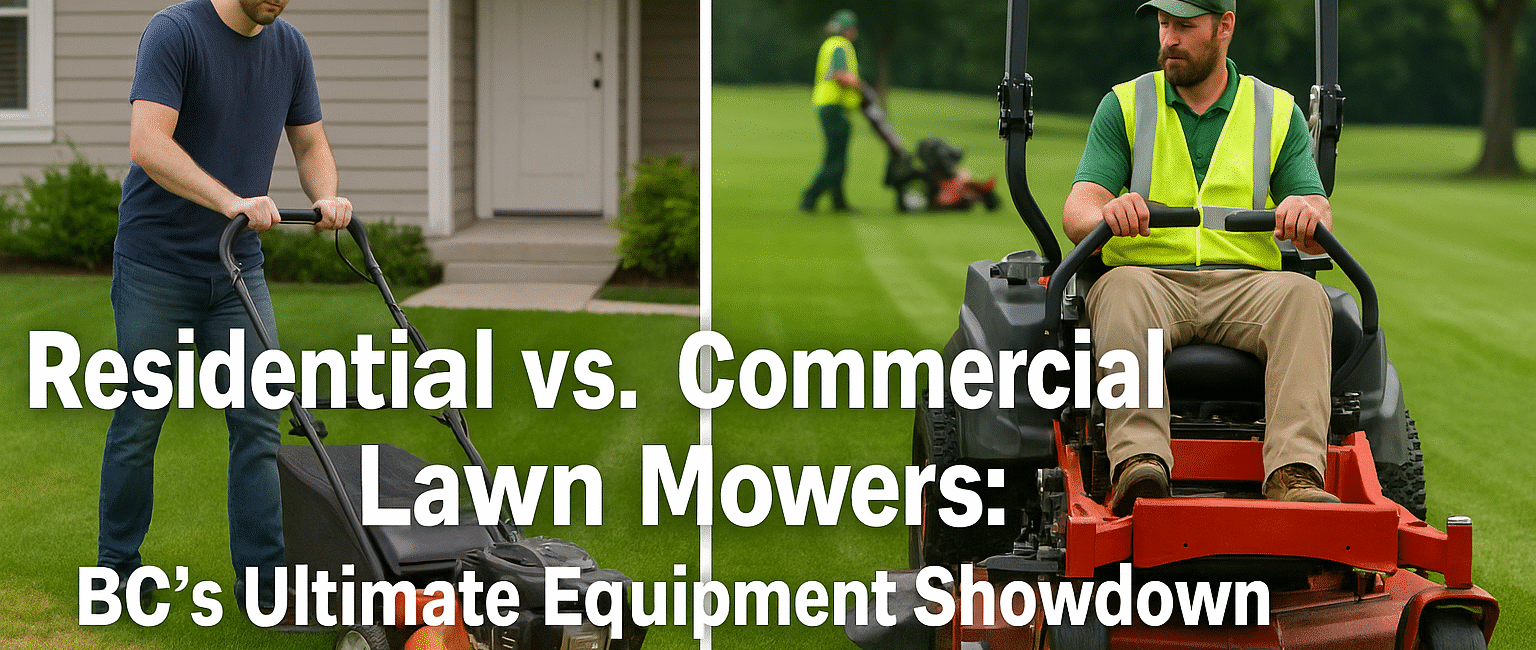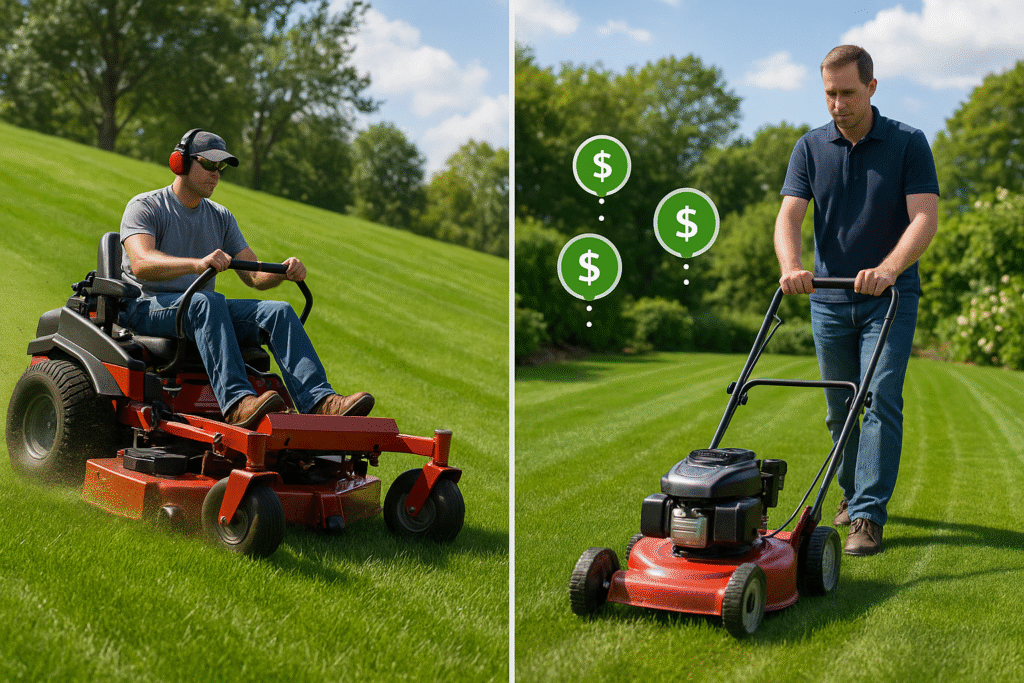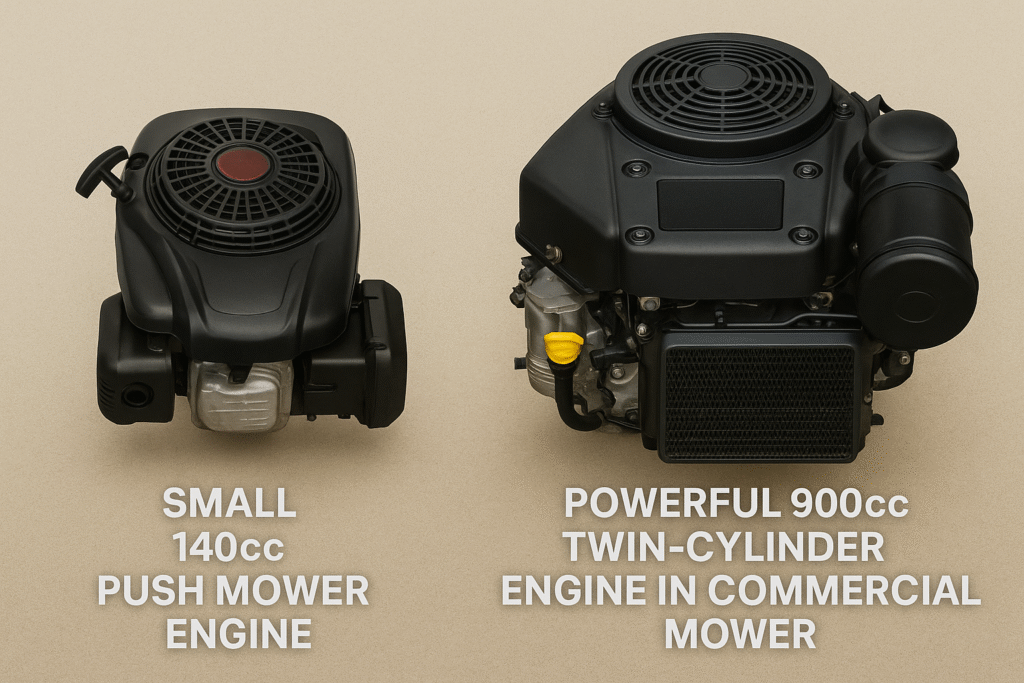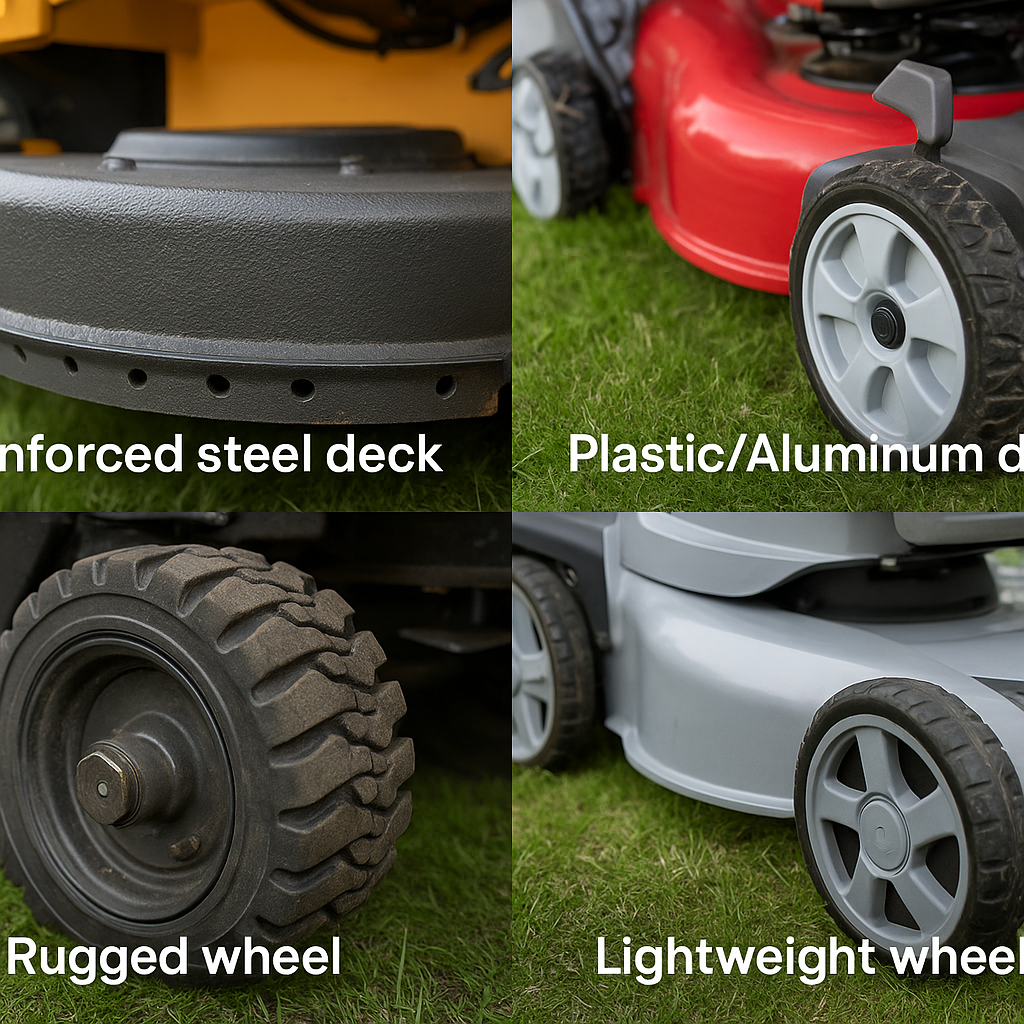
Ever watched a professional landscaping crew zip through a property in half the time it takes you to mow your own lawn? You’re not imagining things – there’s a significant difference between commercial-grade equipment and the residential push mower sitting in your garage.
Whether you’re a Surrey homeowner debating an equipment upgrade or a Fraser Valley property manager weighing your options, understanding these differences can save you time, money, and a lot of frustration.
The Performance Gap: Why Pro Mowers Cut Differently 🏎️
Commercial mowers aren’t just bigger versions of residential models – they’re engineered for entirely different demands. Professional landscapers in British Columbia face diverse terrain, from manicured West Vancouver lawns to rugged Richmond acreage, often cutting 8-10 hours daily during peak season.
Speed and Efficiency
Commercial zero-turn mowers can cover 3-5 acres per hour, while your typical push mower handles about 0.3 acres in the same timeframe. This isn’t just about convenience – it’s about precision at speed. Professional equipment maintains consistent cut quality even when moving quickly across uneven terrain.
Cut Quality Consistency
Residential mowers often struggle with thick grass or damp conditions, leaving behind clumps or uneven patches. Commercial units feature higher blade tip speeds (often 18,000+ feet per minute) and superior deck designs that create better airflow, resulting in cleaner cuts regardless of grass conditions.

Engine Power: The Heart of the Difference 💪
The engine tells the real story of performance differences:
Residential Push Mowers:
- Typically 140cc-190cc single-cylinder engines
- 3-6 horsepower range
- Air-cooled systems
- Designed for 1-2 hours of weekly use
Commercial Equipment:
- 600cc-900cc+ engines (often twin-cylinder)
- 15-35+ horsepower
- Liquid-cooled systems with oil filters
- Built for 40+ hours of weekly operation
This power difference affects everything from hill climbing ability to mulching performance. Commercial mowers maintain consistent blade speed under load, while residential units often bog down in thick grass or wet conditions.

Durability: Built for Different Lifespans 🛡️
Construction Quality
Commercial mowers feature reinforced steel decks (often 10-gauge or thicker), heavy-duty spindle assemblies, and commercial-grade transmissions. Residential models typically use lighter materials to keep costs down – perfectly adequate for weekend use but not built for daily punishment.
Component Lifespan
A well-maintained commercial mower can operate 2,000-3,000 hours before major overhauls. Residential equipment is typically designed for 300-500 hours of lifetime use. For Surrey homeowners mowing weekly from April through October, that translates to roughly 8-12 years of service life.

Cost Analysis: More Than Just Purchase Price 💰
| Feature | Residential Push Mower | Commercial Mower |
|---|---|---|
| Initial Cost | $300-$800 | $8,000-$25,000+ |
| Annual Maintenance | $50-$150 | $500-$1,500 |
| Fuel Efficiency | 1-2 hours per gallon | 3-5 gallons per hour |
| Typical Lifespan | 8-12 years | 15-20+ years |
| Resale Value | 20-30% after 5 years | 40-60% after 5 years |
Hidden Costs to Consider:
- Commercial equipment requires more expensive parts and specialized service
- Insurance and storage considerations for high-value equipment
- Licensing requirements for commercial use in some BC municipalities
Terrain Handling: Where Differences Show 🏔️
British Columbia’s diverse landscape presents unique challenges. Commercial mowers excel on:
Slopes and Hills
Commercial units often handle 15-20 degree slopes safely, with lower centers of gravity and superior traction systems. Most residential push mowers become unsafe on slopes exceeding 10-12 degrees.
Rough Terrain
Professional equipment features adjustable suspension, larger wheels, and reinforced components designed for uneven ground, rocks, and debris that would damage residential equipment.
Maintenance Requirements: Time vs. Money Trade-offs 🔧
Residential Maintenance:
- Annual tune-ups typically cost $80-$150 in the Vancouver area
- Basic oil changes, spark plug replacement, blade sharpening
- Most homeowners can handle routine maintenance
Commercial Maintenance:
- Requires specialized knowledge and tools
- Regular hydraulic system service, complex engine maintenance
- Professional service often necessary, increasing operating costs
When Does Commercial Make Sense for Homeowners? 🤔
Property Size Considerations:
- Properties over 2 acres often justify commercial equipment efficiency
- Multiple properties (rental management, hobby farms)
- Challenging terrain where residential equipment struggles
Time Value Analysis:
If you value your weekend time at $50/hour and commercial equipment cuts your mowing time from 4 hours to 1 hour, the time savings alone can justify higher equipment costs within 3-4 years.
Local Considerations for BC Property Owners 🍁
Climate Factors:
BC’s wet springs and dense grass growth patterns favor commercial equipment’s superior mulching and wet-grass handling capabilities. Professional-grade machines maintain performance in conditions that bog down residential units.
Municipal Regulations:
Some Fraser Valley and Vancouver Island municipalities have noise bylaws affecting when you can operate equipment. Commercial mowers often include better muffling systems but may still face restrictions in residential areas.
Seasonal Storage:
Commercial equipment requires more substantial storage solutions – important for BC’s wet winters. Factor in garage space or storage facility costs when considering upgrades.
The Verdict: Choosing What Fits Your Needs 🎯
For most Surrey and Vancouver area homeowners with properties under 1 acre, a quality residential mower provides excellent value. The key is matching equipment capability to actual needs rather than wanting professional results with consumer-grade tools.
Consider commercial equipment if you:
- Manage multiple properties
- Have terrain challenges (slopes, obstacles, large areas)
- Value time savings over initial cost savings
- Plan to offer mowing services to offset equipment costs
📣 Call to Action
Want a no-fuss mower recommendation based on your yard size and lifestyle? Head to BCServiceFinder.ca to get matched with local experts and service options.
Frequently Asked Questions ❓
How long do commercial mowers typically last compared to residential ones?
Commercial mowers are built for 2,000-3,000 operating hours and can last 15-20+ years with proper maintenance. Residential mowers typically last 300-500 hours or 8-12 years of normal homeowner use. The key difference is commercial units are designed for daily use while residential models are built for weekly operation.
Can I use a commercial mower on my residential property in Surrey BC?
Yes, there are no restrictions on using commercial equipment for personal use. However, check local noise bylaws as some municipalities restrict operating hours for power equipment. Also consider whether your property has adequate storage and whether the equipment size is practical for your lot.
What’s the real cost difference over 10 years between commercial and residential mowers?
A residential mower might cost $2,000-4,000 total over 10 years (purchase + maintenance + replacement). A commercial unit could cost $12,000-20,000 but offers significantly better performance and often lasts longer. The break-even point depends on property size and how much you value time savings.
Do commercial mowers require special licensing or insurance in British Columbia?
For personal use, no special licensing is required. However, if using commercial equipment for business purposes, you may need liability insurance and business licensing depending on your municipality. Check with your local BC city hall for specific commercial landscaping requirements.
Which type of mower handles BC’s wet spring conditions better?
Commercial mowers significantly outperform residential units in wet conditions due to higher blade tip speeds, better deck design, and more powerful engines that maintain performance under load. They’re specifically designed to handle the dense, wet grass growth common in BC’s climate during spring months.
💬 Found This Helpful?
If you found this comparison valuable, please share it with your friends on Facebook so they can make better decisions when buying their next mower! Every homeowner deserves to know what they’re really getting for their investment.


